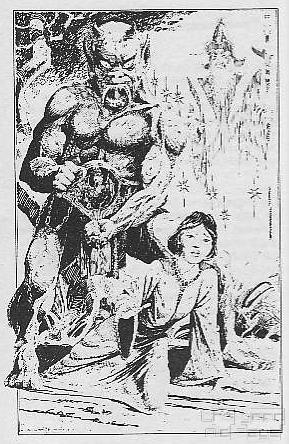Granted, some years had passed since James Clavell's Shōgun had hit literally everyone's TV. The miniseries featuring Richard Chamberlain at his most charming found the right balance between exciting action, romance and the fascination of a clichéd glimpse into an imaginary, foreign world to stick to people's minds. Samurai were still a thing. And so, Fighting Fantasy got such a book. Mixing such clichés as a rigid code of honour, ritual seppuku with the usual creatures from fantasy and mythology.
On a mission to retrieve a magic sword, symbol of rulership, from an evil ghost, the player character can choose one special samurai ability at the beginning. Archery, sneaking, wielding two swords… this choice influences a handful of scenes throughout the book, but it is not a game winning or breaking decision. Providing flavour here and there, good.

The second specialty lies in the honour system. Points are awarded of lost for specific decisions abiding to a basic code of conduct. There is little surprise there; anyone who has ever seen a samurai movie, read a samurai story will have no issues foreseeing the “honourable” choices which will be rewarded. Meaning the points which will finally be needed towards the end more or less automatically pile on the account. It doesn't hurt, but doesn't bring much in terms of entertainment or complexity, either.
Otherwise, strange design choices have been made. The whole book feels imbalanced, inconsistent in various respects. Fights are much too hard, various unavoidable high-skilled enemies waiting. The very first choice is an east-west decision. This initiates one of two fundamentally different paths through the story, each wholly linear. Not a bad thing per se, but one may as well be called “dead man walking” path. Even putting the fights aside, that path does not contain nearly sufficient opportunities to gain honour points, without which the finale, where the paths converge again, becomes realistically impossible.
Structurally, the midpoint has the player meeting a riddling dragon. Answering involves a math mechanic which does not give the options which section to jump to explicitly. Likely meant to prevent cheating, this is obviously the hardest section. Whereas at the end, the book simply asks: “Do you know the following secret? If so, turn to xyz”. And even right before that, a particularly lazy structural design choice occurs where the player is at a hub and must choose one of eight doors; though finally, after each, they are sent back to the same hub and there is no reason not to go through each anyway. Behind each door, a scene completely out-of-this-world scene waits, bearing no link to anything else. Indicating the authors really wanted those in there, but didn't find a way to include them organically.
Mind you, some of those encounters behind the doors or otherwise aren't half bad. Certainly the book has some memorable individual scenes. Overall, however, things don't come together sufficiently and from a game mechanic standpoint, it is close to broken. There is broad variety waiting, the material and ideas are there. Yet still, it's not a good book.


Comments (1) [Post comment]